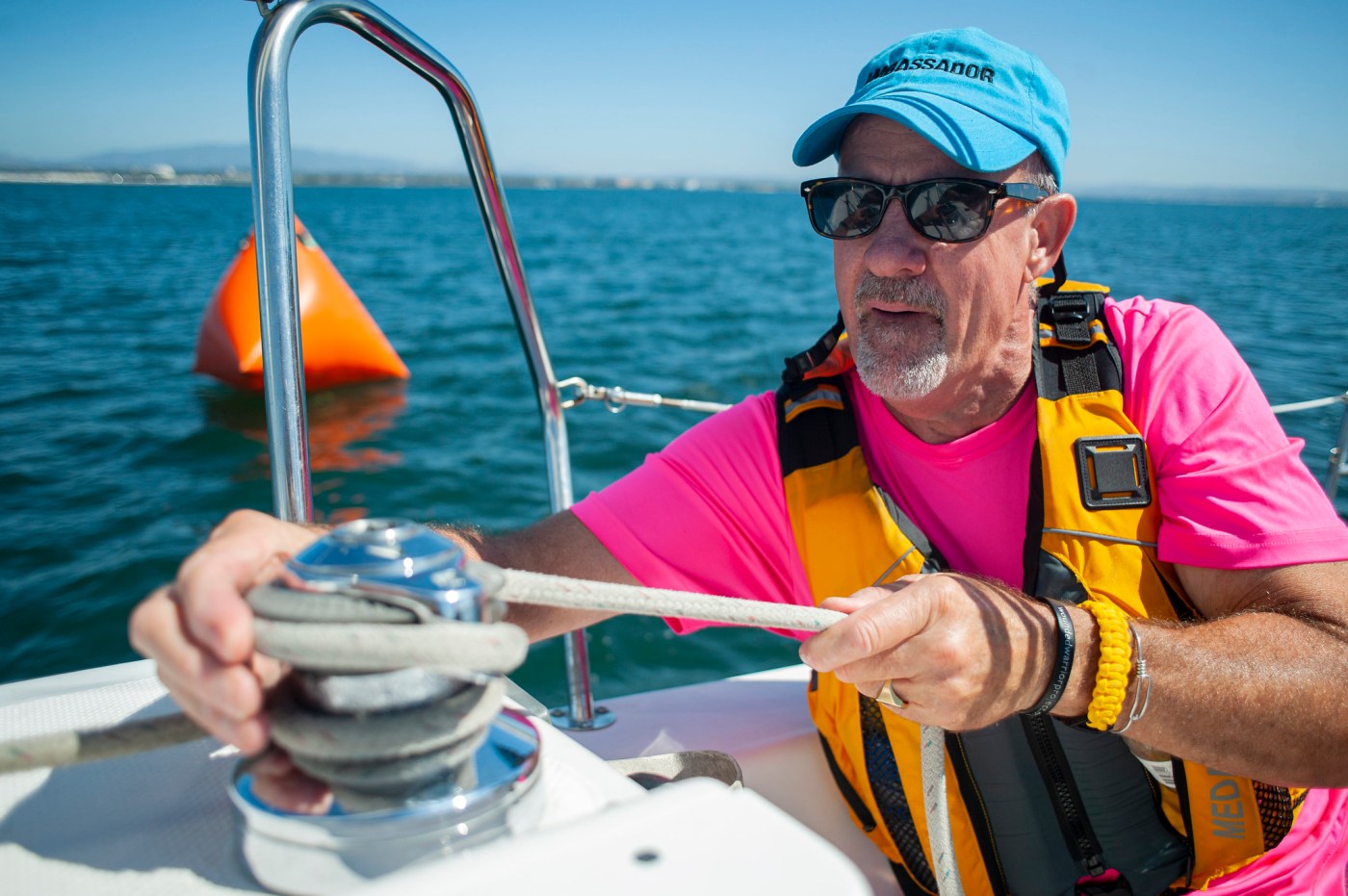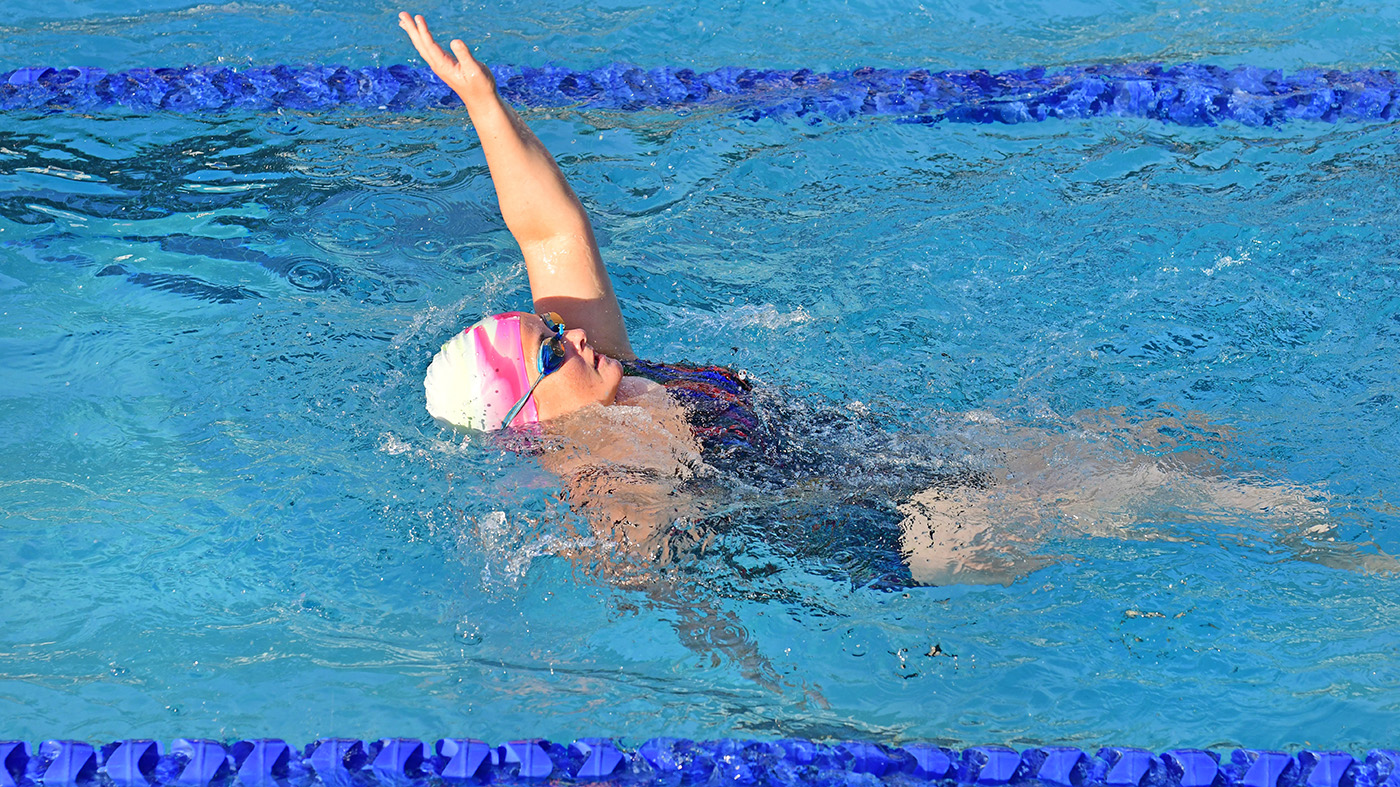
Chuck Miller, a totally blind Army Veteran, has been an ambassador at the Summer Sports Clinic the last three years.
“It was a long walk into darkness … “
That’s how Chuck Miller describes his maddening descent into blindness — something he refused to accept as his world slipped away, little by little.
The Army Veteran, who gets care at the Gainesville VA Medical Center, is the first blind Veteran sailor certified by the American Sailing Association. He’s also an ambassador at the National Veterans Summer Sports Clinic, where he connects with others to help them adjust to different disabilities.
The clinic brings blind, amputee and paralyzed Veterans, and those living with post-traumatic stress, to San Diego, Calif., Sept. 15 to 20, for adaptive surfing, sailing, cycling and kayaking.
“One of the most difficult things about being disabled is acceptance. That to me is one of the biggest struggles Veterans have…“
Miller stops and cries for a moment.
“You know, something significant changes in their lives and they try to ignore it. That’s what I did. I was a proud soldier. Being a soldier was everything to me.”
Going blind
Miller, a single dad with full custody of his son, was first diagnosed with spots on his retina in 1984.
“They just said, ‘You have something wrong with your eyes. They weren’t sure,” he said.
In 1990, his doctor diagnosed him with Retinitis Pigmentosa, a rare, genetic disorder that breaks down cells and creates scar tissue on the retinas.
“The retinas become so damaged, they’re basically dead,” Miller said. “The only problem I was having was night vision problems and some depth perception. It was difficult to accept. It went on for another 15 years and wasn’t at the point I couldn’t function. I was still driving, still doing normal work. It didn’t register at the time. I just thought, ‘Well, I got an eye problem.’”
“You need to quit driving. You’re going to kill somebody if you don’t.”
— Chuck Miller’s doctor, leveling with him in 2005 as his vision got worse
By 2005, a doctor leveled with him. “You need to quit driving. You’re going to kill somebody if you don’t.”
“I still didn’t listen until I T-boned somebody in my car,” Miller said.

Chuck Miller chats with James Byrne, the deputy secretary of VA, while sailing with him at the Summer Sports Clinic.
By 2009, he was blind, only seeing light but nothing else.
“I remember when I realized I was going blind, how terrified I was,” he said. “Just like every Veteran, I went through a dark period. I drank, I did drugs, I wanted to kill myself. Thought I’m not worthy as a father, which is one of the most important things in my life. I literally pushed every single person away from me. I lost every friend I had as a sighted person.”
Fighting rehabilitation
Miller’s turning point came when he went to the Blind Rehabilitation Center at the Birmingham VA Medical Center.
“Don’t leave,” he told his friend who drove him there. “I’m not staying. I’m going back home. It’s not for me.”
His friend left anyway.
“That’s where you have to learn to be that disability,” he said. “You have to face it. That’s when you have to say, ‘Damn, I’m blind,’ or, “Damn, I’m this,’ or whatever,” Miller said.
He fought against instructors and struggled to learn skills needed to live in his sightless world. Instructors paired him with a roommate who was blinded at 18 in Vietnam, in hopes he could learn to accept it.
“I was talking all kinds of junk, but inside I was afraid. It’s easy to picture doing this stuff in your mind, but doing it is scary.”
— Chuck Miller, talking about is first trip to the Summer Sports Clinic
“I was pretty angry,” Miller said. “The first couple of days, he’d lay in his bed, and he’d pray out loud to God, thanking him for his day, thanking God for being blind, and I’m thinking, ‘What the hell is wrong with you? How could you be so thankful for being disabled?’”
“Man, this is a gift, you just don’t know it yet,” his roommate said. “I get to see things different. I get to see how people are on the inside.”
Miller remembers one day in class, trying in frustration to put together a leather belt kit. The next day, his instructor gave him glasses that blocked out light.
“And I put that thing together in less than an hour,” he said. “I started to see through my fingers.”
Miller gave in, and his world without sight came into focus.
“They start taking me places. Up and down stairs, escalators, crossing four-lane roads. Before that, I wouldn’t go out without holding onto anybody. I learned braille. Found out I’m a natural. I’m sick, I actually took algebra in braille.”
Summer Sports Clinic
He put on a brave face at his first Summer Sports Clinic in 2015.
“I was talking all kinds of junk, but inside I was afraid,” he said. “It’s easy to picture doing this stuff in your mind, but doing it is scary. My first day was surfing, and I was pretty scared to go out there. I don’t know where the beach is at, I can’t see the water. At the end of the day, I was the last one out. I start thinking, ‘This is pretty freaking cool!’
“I had never sailed before in my life. You’re overwhelmed in that first year because there’s so much to take in, but from there I did a five-day sailing clinic in St. Petersburg, Florida, and they put me on a boat with a paraplegic in a wheelchair and a coach. And I’m thinking, ‘We’re screwed.’ But it’s all about exposure.”
Miller fell in love with sailing so much he got his American Sailing Certification with a score of 95 out of 100. He sails with a sighted coach, but does the work himself — untying ropes, hoisting the mast, trimming the sail to catch the wind, and steering.
“When I’m on the water,” he said, “I feel the wind blowing, the birds, the sounds of the ocean, the sun on my face. I enjoy it in a way that a sighted person can’t experience.”
Cory Kapes, who runs Warrior Sail at the clinic, said Miller sets the example. Kapes even let him steer the boat as he came into shore one day, where other boats were only 20 feet away.
“If these people knew I was blind, they’d have a heart attack,” Miller said.
“Just keep smiling and waving,” Kapes said with a laugh.
“It just shows you the impact this clinic can have,” Kapes said. “He never sailed a boat before he came here. He brought it home. That’s what we want other Vets to do — bring it home, go kayaking, be committed, make it part of your active lifestyle.”
Ambassador
For the last three years as an ambassador, Miller traveled from Florida to San Diego by himself. When needed, he has a special pair of glasses with a built-in camera that connects him to a live agent to help him navigate. But more often than not, he uses his blind guiding cane.
Most Veterans find Miller by his bright pink, volunteer T-shirt, cutting up and telling jokes.
“Hey nice to see you! Well, not really, but you get the idea … ” he tells one Veteran.
“I’m Blind Chuck! Would it help if I take off my glasses?” he tells another. “Look, I take off my glasses, I don’t look blind. I put the glasses on, blind! I can look at you, but you know I can’t see you, right?”
He took the deputy secretary of Veterans Affairs on the water, making jokes and cutting up about everyone’s military branch while sailing.
Fellow Veteran Michelle Marie Smith, who gets her care at the Sacramento VA, said listening to Miller at the sailing class was a highlight.
“Oh yeah,” she said. “It definitely puts everything in perspective. If I had any doubt, I don’t after listening to him.”
Miller said that’s what it’s all about.
“What I’ve learned from this clinic here – and this is important for Veterans to understand – not only can you do things as a disabled person, get to know these volunteers, therapists and team leaders. The only thing they care about is teaching you how to do these sports. They want you to succeed and you just have to trust them.”
Topics in this story
More Stories
Nearly 400 Veterans from across the country have gathered in Snowmass Village for the 39th Annual National Disabled Veterans Winter Sports Clinic. This premier adaptive rehabilitation event, co-presented by VA and Disabled American Veterans (DAV), continues through April 5.
Older than the PGA, 108-year-old Veteran Donald Johnson is still getting out on the golf course with the National Disabled Veterans Golf Clinic.
West Virginia mom builds confidence at the National Veterans Wheelchair Games.






